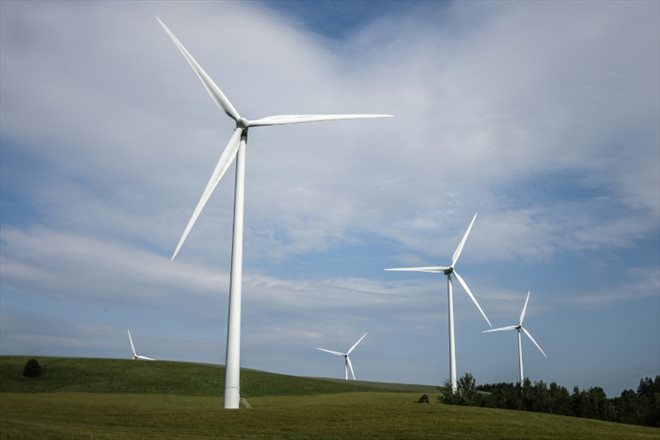Wind turbines near Salles-Curan, in Aveyron, June 1, 2023 (AFP/Archives/Charly TRIBALLEAU)
The Twenty-Seven approved on Monday legislation almost doubling the share of renewables in energy consumption by 2030 in the EU, where an exemption on hydrogen produced from nuclear power was introduced to satisfy Paris.
The legislation was adopted by MEPs in mid-September, and the green light from the Council of the EU (the States) paves the way for its entry into force. It comes two weeks before the expected announcement of a new regulatory package proposed by Brussels to support the wind power sector.
The adopted text, the result of an agreement concluded at the end of March between the European Parliament and the Member States, sets the binding objective of at least 42.5% of renewable energies in European consumption by 2030, against a level currently around 22%.
It also includes an “indicative” target of 45% that the Twenty-Seven will strive to achieve.
The new legislation notably speeds up authorization procedures, with the establishment of “dedicated zones” where national authorities will be required to approve new renewable energy installations within 12 months maximum (deadline limited to 24 months outside – three years for offshore wind turbines). In the absence of a response for projects in dedicated areas, agreement will be considered granted.
These provisions could be further relaxed for wind turbines in the legislative proposals prepared by the Commission.
In transport, by 2030 States will have to either reduce the intensity of greenhouse gases by 14.5% thanks to renewables, or reach 29% of renewables in the sector’s final energy consumption. Indicatively, the EU also plans for 49% renewables in the energy consumption of buildings.
Finally, in 2030, in each country, at least 42% of the hydrogen used by industry must have been manufactured from renewable energies.
The agreement provides flexibility for countries with a nuclear fleet that can produce carbon-free hydrogen, allowing them to lower this “green” hydrogen target by half provided that the share of hydrogen produced from Fossil fuels do not exceed 23% of their consumption.
However, France had deemed this threshold inapplicable due to its significant production of ammonia (raw material for nitrogen fertilizers), from hydrogen manufactured by steam reforming of natural gas.
Following tough discussions with several countries resistant to nuclear power, Germany in the lead, Paris had obtained that the ammonia factories concerned be under certain conditions excluded from the calculation if they have been the subject of investments to reduce their CO2 emissions.
Furthermore, the text reinforces the “sustainability” criteria required for biomass (wood burned for energy) while maintaining its “renewable” status, to the great dismay of environmental NGOs hostile to the practice.
© 2023 AFP
Did you like this article ? Share it with your friends using the buttons below.




